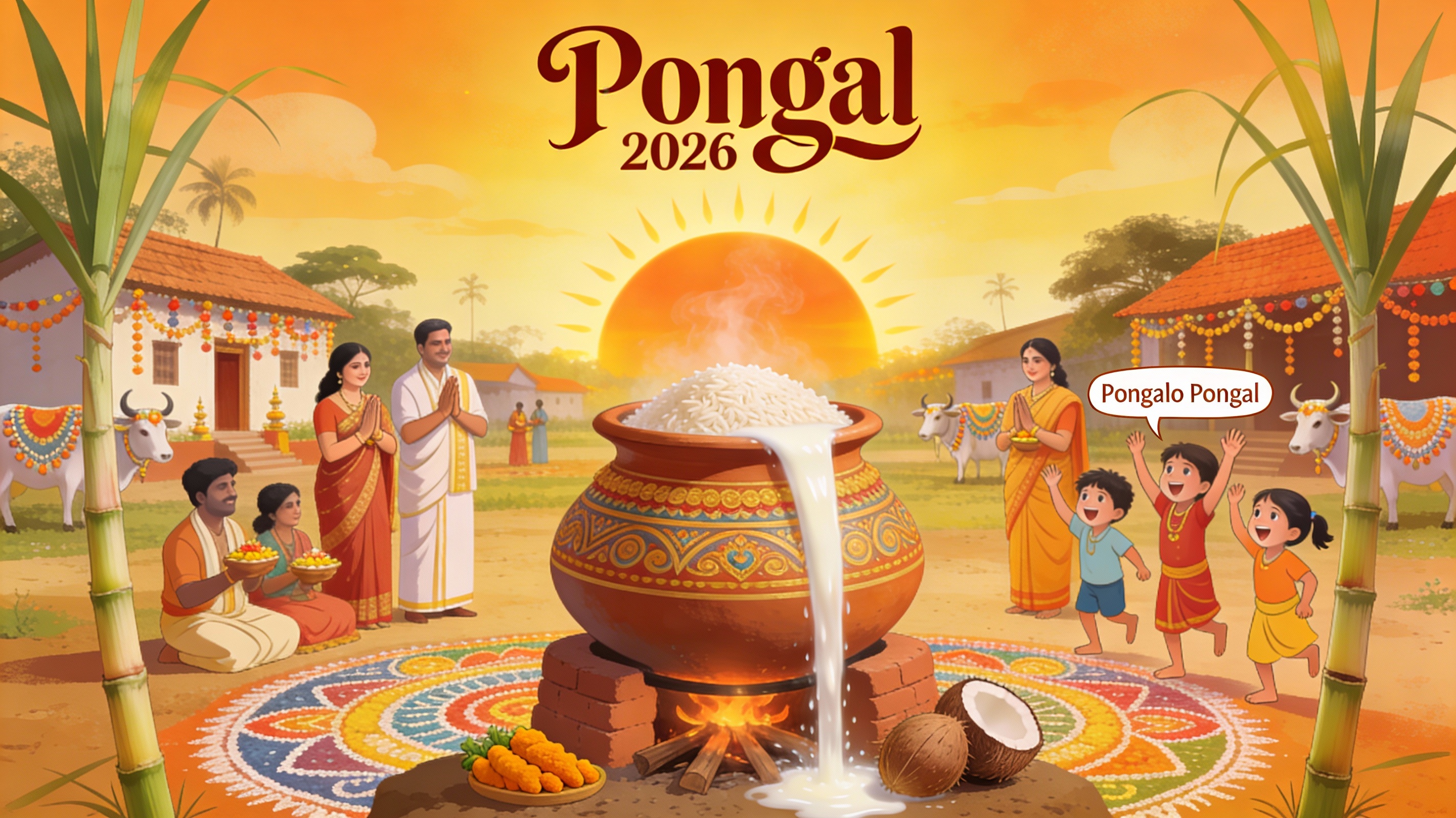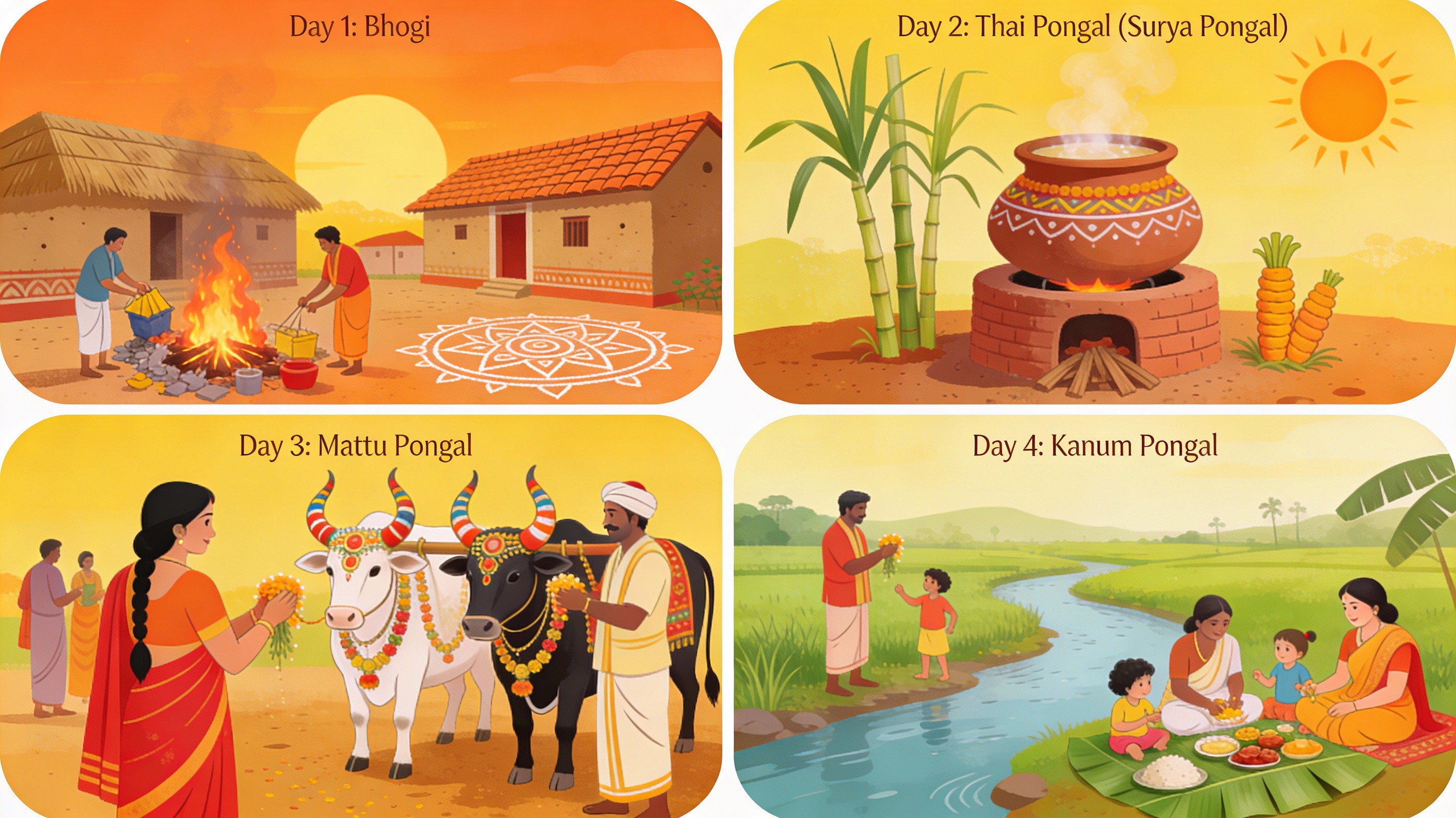Pongal 2026: Bhogi Pongal, Thai Pongal, Mattu Pongal, Kanum Pongal - Dates, Time, Rituals, and Significance
When is Bhogi Pongal, Thai Pongal, Mattu Pongal, Kanum Pongal? Pongal 2026 Tamil Calendar, Holidays and Celebrations
Pongal 2026 is one of the most important festivals for Tamil communities and is celebrated with great joy and enthusiasm across India. In 2026, Pongal will be celebrated from January 13th to 16th, with the main day, Thai Pongal, falling on January 14th, 2026. It’s a harvest festival that honors the Sun God, and is celebrated with traditional rituals, festive foods, and joyous gatherings.

In pongal in 2026, the festival will be celebrated with traditional rituals, festive food, kolams, prayers, and family gatherings. This article explains pongal 2026, its dates, time, holidays, significance, and how it appears in the 2026 Tamil calendar.
Also Read: Happy Pongal Wishes – Check 100+ Pongal Wishes in Tamil
What is the Pongal Festival?
Pongal is a traditional Tamil harvest festival. The word Pongal comes from the Tamil word “pongu”, meaning “to boil over”. It symbolises happiness, prosperity, and abundance in life.
Pongal Marks:
The end of the harvest season
The beginning of Uttarayana, the Sun’s northward movement
Gratitude to nature and agriculture
The festival is mainly dedicated to:
Surya (Sun God)
Farmers
Cattle, which support farming
When is Pongal in 2026?
Pongal in 2026 will be celebrated over four days, from January 13 to January 16, 2026. This traditional Tamil harvest festival begins in the Tamil month of Thai, which is considered highly auspicious.
The festival dates are decided using the Tamil calendar, not the Gregorian calendar. Pongal begins when the Sun moves into the zodiac sign Capricorn (Makara), marking the start of the Sun’s northward journey. This celestial transition is the main reason Pongal is celebrated on different dates each year.
Pongal 2026 Date in Tamil Nadu
Across Tamil Nadu, Pongal is observed on the same days with great enthusiasm. Families follow traditional rituals, prepare festive meals, and take part in cultural activities throughout the state.
Pongal Date 2026 (Day-wise)
Bhogi – January 13, 2026 (Wednesday)
Thai Pongal / Surya Pongal – January 14, 2026 (Thursday)
Mattu Pongal – January 15, 2026 (Friday)
Kanum Pongal – January 16, 2026 (Saturday)

Pongal 2026: Time and Rituals
As per the Tamil Panchangam, the Thai Pongal Sankranti Moment in 2026 occurs on January 14 at 03:13 PM. This marks the Sun’s entry into the zodiac sign Capricorn (Makara), making it the most important time for the festival. Below are some of the key auspicious timings to follow for Pongal rituals and prayers.
Pongal Holidays 2026
Pongal is one of the most important public holidays in Tamil Nadu. During this period:
Government offices, schools, and colleges usually remain closed
Many private organisations follow state holiday announcements
Thai Pongal and Mattu Pongal are commonly declared official holidays
These holidays give families time to come together, travel to their hometowns, participate in traditional celebrations, and enjoy the festive spirit without work or academic pressure.
Pongal Holiday Schedule (Expected)
Four Days of Pongal 2026: Bhogi, Thai Pongal, Mattu Pongal, Kanum Pongal - Explained
Day 1: Bhogi – January 13, 2026
Bhogi marks the start of Pongal celebrations.
Old items are discarded to remove negativity
Bonfires are lit early in the morning
Homes are cleaned and decorated
Prayers are offered for rain and prosperity
Bhogi symbolises renewal and fresh beginnings.
Day 2: Thai Pongal (Surya Pongal) – January 14, 2026
Thai Pongal is the most important day of the festival.
Pongal dish is cooked using new rice, milk, and jaggery
Milk boiling over symbolises abundance
People chant “Pongalo Pongal”
Offerings are made to the Sun God
Kolams decorate the entrance of homes
This day shows gratitude towards nature and the Sun.
Day 3: Mattu Pongal – January 15, 2026
Mattu Pongal is dedicated to cattle.
Cows and bulls are bathed and decorated
Special food is offered to them
Women pray for family welfare
Rural areas hold cultural events and traditions
This day highlights respect for animals in agriculture.
Day 4: Kanum Pongal – January 16, 2026
Kanum Pongal marks the end of the festival.
Families visit relatives and friends
Picnics are organised near rivers and parks
Sugarcane and festive food are shared
Communities come together in joy
Pongal 2026 in the Tamil Calendar
According to the 2026 Tamil calendar, Pongal is celebrated in the month of Thai. The Tamil saying “Thai Pirandhal Vazhi Pirakkum” means that new opportunities begin with the month of Thai.
Difference Between Pongal 2025 and Pongal 2026
Pongal 2025 was celebrated in January 2025
Pongal 2026 falls in mid-January 2026
Though the dates change slightly each year, the rituals and meaning remain the same.
Why Pongal is Important Today
Pongal teaches:
Gratitude towards food and farmers
Respect for nature and animals
Importance of family and community
Balance between tradition and modern life
Even in modern times, 2026 pongal continues to remind people of sustainable living and cultural values.
Conclusion: Pongal in 2026
Pongal in 2026 is more than a festival. It is a celebration of life, nature, and togetherness. Knowing when is Pongal in 2026, understanding the pongal 2026 date, and following the 2026 Tamil calendar helps families prepare and celebrate meaningfully.
Pongalo Pongal!
May Pongal 2026 bring happiness, prosperity, and good health to all.
FAQs on Pongal 2026: Bhogi Pongal, Thai Pongal, Mattu Pongal, Kanum Pongal - Dates, Time, Rituals, and Significance
1. Why do we celebrate Pongal?
Pongal is celebrated to honor the Sun God and express gratitude for a successful harvest. This Tamil festival also acknowledges the hard work of farmers and promotes respect for nature, unity, and community well-being:
- Thanksgiving to the Sun God for agricultural prosperity
- Promotion of environmental and social values
- Celebration of harvest at the start of the Tamil month "Thai"
2. What is the correct date for Bhogi Pongal, Thai Pongal, Mattu Pongal, and Kanum Pongal?
In 2026, the dates for the four-day Pongal festival are as follows:
Bhogi Pongal – January 13, 2026 (Wednesday)
The first day of Pongal, marked by bonfires and cleaning rituals to discard the old and make way for the new.Thai Pongal (Surya Pongal) – January 14, 2026 (Thursday)
The main festival day, dedicated to the Sun God for a good harvest, celebrated with the traditional dish "Pongal."Mattu Pongal – January 15, 2026 (Friday)
A day to honor cattle, especially cows and bulls, which are decorated and worshipped for their role in farming.Kanum Pongal – January 16, 2026 (Saturday)
The final day of the festival, focused on family reunions and community celebrations.
These dates follow the Tamil Calendar and are celebrated with regional rituals and family gatherings across Tamil Nadu and other parts of South India.
3. In which state is Pongal celebrated?
Pongal is predominantly celebrated in Tamil Nadu, but it is also observed by Tamil communities across India and worldwide. Similar harvest festivals are celebrated in Andhra Pradesh, Karnataka, Telangana, and Sri Lanka with regional names.
4. Which God is worshipped on Pongal?
The Sun God (Surya) is worshipped on Pongal. The Pongal dish is offered first to Surya as a mark of gratitude for sunlight and harvest blessings.
5. What are the four days of Pongal and their significance?
Pongal is a four-day festival, each with special customs:
- Bhogi Pongal: Cleansing homes, discarding old items, and lighting bonfires
- Thai Pongal: Main festival day; preparing and offering Pongal dish
- Mattu Pongal: Honoring cattle and their role in agriculture
- Kaanum Pongal: Family gatherings, outings, and sharing blessings
6. What is the main dish prepared during Pongal?
Pongal dish is the primary food cooked during the festival. It can be sweet (Chakkara Pongal) or savoury (Venn Pongal), both prepared with new harvest rice and shared as a symbol of prosperity and joy.
7. How is Pongal celebrated in 2026?
Pongal in 2026 is celebrated from January 15th as a vibrant harvest festival with rituals and gatherings:
- Cooking and offering Pongal to the Sun God
- Cleaning homes and participating in community bonfires
- Respecting and decorating cattle on Mattu Pongal
- Family reunions, social visits, and eco-friendly practices
8. What is the meaning of the word 'Pongal'?
'Pongal' comes from the Tamil word meaning "to boil over". It symbolizes abundance, prosperity, and the overflowing of joy and gratitude during the harvest.
9. What values does Pongal promote among students?
Pongal encourages gratitude, teamwork, respect for nature, and cultural unity among students. It inspires young learners to adopt eco-friendly habits and appreciate agricultural traditions while developing a sense of responsibility.
10. How can one celebrate Pongal in an eco-friendly way?
To celebrate Pongal sustainably:
- Use clay pots and natural ingredients for cooking
- Share food to avoid waste
- Practice safe bonfire habits
- Invite diverse friends to participate
- Balance celebrations with mindful breaks
11. Is Pongal celebrated outside India?
Yes, Pongal is celebrated by Tamil communities globally, especially in Sri Lanka, Malaysia, Singapore, and parts of the Middle East, reinforcing cultural ties worldwide.
12. What are some important rituals associated with Pongal?
Important Pongal rituals include:
- Boiling over Pongal dish as a symbol of prosperity
- Offering the first share to Sun God
- Decorating homes with kolam (rice flour designs)
- Honoring cattle with ornaments and special feed
- Community gatherings and sharing sweets
13. When is Pongal 2026?
Pongal 2026 is celebrated from January 13 to January 16, 2026. The main festival day, Thai Pongal, falls on Wednesday, January 14, 2026.
14. Is Pongal on January 13 or January 14 in 2026?
Both dates are correct.
January 13 is Bhogi Pongal, the first day.
January 14 is Thai Pongal, the main day of the festival.
15. What is the first day of Pongal called?
The first day of Pongal is called Bhogi Pongal. It is dedicated to cleaning homes, letting go of the old, and welcoming new beginnings.
16. Why does Pongal date change every year?
Pongal follows the solar calendar and begins when the Sun enters the zodiac sign Capricorn (Makara). This solar movement determines the date.
17. How many days is Pongal celebrated?
Pongal is celebrated for four days — Bhogi, Thai Pongal, Mattu Pongal, and Kanum Pongal.







